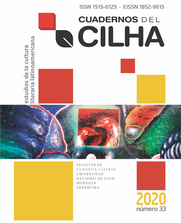The nightmare of happiness in La perra, by Pilar Quintana
Keywords:
(Un)happiness, Colombian Novel, Maternity, Political Emotions, Pilar QuintanaAbstract
The idea of (un)happiness is proposed as the aesthetic principle that defines the compositional elements of the novel La perra, by Pilar Quintana. We propose that based upon the exploration of a saddened self because of an undone "promise of happiness", the writing style shapes an aesthetic of the remoteness of what is desired, which expressed through images of desolation, exposes the most intimate aspects of the characters and the events. The tone of the narration produces a dense atmosphere: inhabited by the remoteness of desire and the escape of beauty. The places, the time, the topic, the turns of language are constituted as the symbolic epicenter of who possesses nothing, but risks everything in pursuit of that something that will distance him from the dread of routine. The aesthetics of the frustrated desire means the loss of the ability to produce a future and, at the same time, it explores the unhappy state of the alienated subject who does not stop dreaming, although dreams turn into horror or nightmare.
References
Ahmed, S. (2019). La promesa de la felicidad. Una crítica cultural al imperativo de la alegría. Caja Negra.
Ahmed, S. (2015). La política cultural de las emociones. Universidad Autónoma de México.
Bartra, R. (2012). La batalla de las ideas y las emociones. En M. Moraña e I. Sánchez Prado (Eds.), El lenguaje de las emociones. Afecto y cultura en América Latina (págs. 17.36). Iberoamericana y Vervuert.
Bauman, Z. (2009). El arte de la vida. De la vida como obra de arte. Paidos, 2009.
Bueno, G. (2005). El mito de la felicidad. Autoayuda para desengaño de quienes buscan ser felices. Ediciones B.
Camp, V. (2011). El gobierno de las emociones. Herder.
Boquet, Damien et Nagy, P. (2009). Le sujet des émotions au moyen âge. Beauchesne.
Boquet, Damien et Nagy, P. (automne 2011). Une histoire des émotions incarnées. Médiévales, 61, 5-24.
Del Sarto, A. (julio/diciembre 2012). Los afectos en los estudios culturales latinoamericanos. Cuerpos y subjetividades en Ciudad Juárez. Cuadernos de Literatura, 32, 41-68.
García Lorca, F. (1934). Yerma. Obra dramática. Disponible en: http://www.cervantesvirtual.com/obra-visor/yerma-775116/html/2adf6d89-47d4-48e3-a945-048c8fb78eae_2.html
Gregg, M. & Seigworth, G. (2010). The Affect Theory Reader. Duke University Press Books, 2010.
Han, B.-C. (2019). Loa a la tierra. Un viaje al jardín. Herder.
Leonardo-Loayza, R. A. (2020). Maternidades proscritas, mandatos sociales y violencia en la novela La perra, de Pilar Quintana. Estudios de Literatura Colombiana, 47, 151-168.
Lodge, D. (2002). El arte de la ficción. Península.
Lyons, W. (1980). Emotions. University Press.
Massumi, B. (2000). Parables for the Virtual: Movement, Affect, Sensation. Duke University Press.
Moraña, M. y Sánchez Prado, I. (Eds.). (2012). El lenguaje de las emociones. Afecto y cultura en América Latina. Iberoamericana y Vervuert.
Nancy, J. L. (1993). Le sens de monde. Éditions Galilée.
Nussbaum, M. C. (2008). Paisajes del pensamiento. La inteligencia de las emociones. Paidós.
Nussbaum, M. C. (2012). La terapia del deseo. Teoría y práctica en la ética helenística. Paidos.
Nussbaum, M. C. (2014). Emociones políticas. ¿Por qué el amor es importante para la justicia? Paidós.
Peluffo, A. (2005). Lágrimas Andinas: Sentimentalismo, Género y Virtud Republicana en Clorinda Matto de Turne. Instituto Internacional de Literatura Iberoamericana, Universidad de Pittsburgh.
Peluffo, A. (2016). En clave emocional. Cultura y afecto en América Latina. Prometeo.
Quintana, P. (2017). La perra. Penguin Random House.
Quintana, P. (2018). La literatura de lo sencillo. Entrevista. https://www.youtube.com/watch?v=1O4JNZ0I4t8
Russell, B. (2018). La conquista de la felicidad. Penguin Random House.
Rosenwein, B. (2002). "Worrying about Emotions in History". American Historical Review, 107, 821- 845.
Rosenwein, B. (2010). Problems and Methods in the History of Emotions. Passions in Context I, 1, 2-32.
Ticineto Clough, P. y Halley, J. (Eds.) (2007). The Affective Turn: Theorizing the Social. Duke University Press.
Ticineto Clough, P. (2008). The Affective Turn Political Economy, Biomedia and Bodies. Theory, Culture & Society, vol. 25 (1), 1-22.
Vanegas Vargas, O. K. (2019a). "La ciudad literaria: entre el registro oficial y la experiencia individual". Visitas al patio, 13, 126-142.
Vanegas Vargas, O. K. (2019b). Expresión estética del resentimiento en narrativas colombianas recientes. Cuadernos del CILHA, 20 (31), 55-74.
Vanegas Vargas, O. K. (2019c). Imaginario emocional de la violencia en narrativas colombianas recientes. Revista Chilena de Literatura, 100, 317-339.
Vanegas Vargas, O. K. (2020). Imaginarios políticos del miedo en la narrativa colombiana reciente. Editorial Universidad del Tolima (en prensa).





















